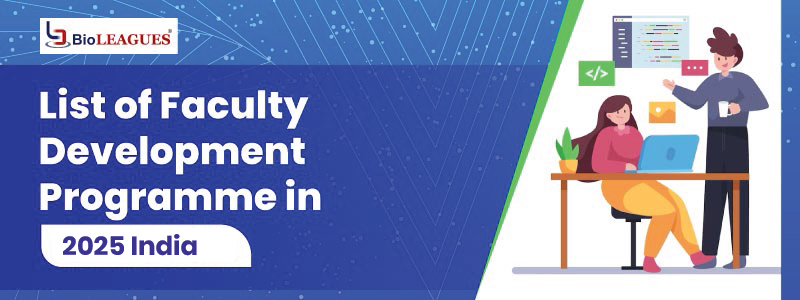The Need for Faculty Development Programs: Navigating the Changing Landscapes in Education
Education is a dynamic field, continually evolving in response to societal, technological, and pedagogical changes. As such, educators must stay abreast of these shifts to ensure effective teaching and learning outcomes. This is where faculty development programme 2025 come into play. They serve as a critical resource for educators to navigate and adapt to the changing landscapes in education.
Technological Advancements and Digital Literacy
- The proliferation of digital technology has had a significant impact on education. Contact us for updates on free online fdp with certificate 2025
- From online courses to digital classrooms, technology has transformed the way education is delivered. This shift necessitates that educators are not only comfortable using these technologies but also adept at leveraging them for effective teaching.
- Faculty development programs can provide the necessary training and resources for educators to gain digital literacy, understand the pedagogical implications of technology, and utilize it to enhance student learning.
Changing Student Demographics and Learning Styles
- Today’s student body is more diverse than ever.
- This diversity extends not just to race, gender, and culture but also to learning styles and educational backgrounds. Faculty Development Programme 2025 can equip educators with the skills and knowledge to accommodate this diversity.
- They can provide insights into different teaching strategies to cater to varied learning styles and foster an inclusive and supportive learning environment.
Evolving Pedagogical Practices
- Pedagogical practices are continually evolving, with newer approaches emphasizing active learning, experiential learning, and student-centered teaching.
- Faculty development programs (along with any well-designed, high-level skill development programme) can help educators stay updated on these trends, providing them with the tools and techniques to implement these practices in their classrooms.
Increased Focus on Research and Scholarship
- In many institutions, there is an increasing emphasis on research and scholarship.
- Faculty development programme 2025 can support educators in developing their research skills, navigating the process of grant applications, and effectively disseminating their findings.
The Demand for Lifelong Learning
- With the rapid pace of change in various disciplines, there is a growing recognition of the importance of lifelong learning.
- Faculty development programs (whether they be a technical or nursing faculty development programme) embody this principle by providing ongoing professional development opportunities for educators.
- upcoming online fdp 2025 in india support educators in their journey of continuous learning and adaptation.
The changing landscapes in education make faculty development programs a necessity for educators. These programs play a vital role in equipping educators with the skills, knowledge, and attitudes needed to navigate these changes and enhance their teaching effectiveness. Therefore, institutions must prioritize faculty development as a strategic initiative to ensure educational excellence and adaptability in the face of change.
Core Components of Effective Faculty Development Programs
- Let’s delve into these fundamental aspects.
Fostering Teaching Excellence
- A significant element of faculty development programs is enhancing educators’ teaching competencies.
- This involves providing training on different pedagogical strategies, classroom management techniques, student engagement, and inclusive teaching.
- Workshops, seminars, and mentorship programs can be instrumental in fostering teaching excellence.
Enhancing Research Skills
- Research is a crucial part of an educator’s role, particularly in higher education.
- Therefore, faculty development programs (along with any expertly-organized staff development programme) should offer resources and training to improve research skills.
- This includes guidance on research design, data analysis, grant writing, and effective dissemination of research findings.
Technological Proficiency
- In today’s digital age, educators must be proficient in using technology for teaching.
- Faculty development programs should provide training on various educational technologies, from learning management systems to digital tools for student engagement.
- Moreover, they should cover the pedagogical implications of technology, focusing on how to effectively integrate technology into teaching practices.
Cultivating Leadership Skills
- Educators often take on leadership roles, whether it’s leading a classroom, a research team, or an academic department.
- Faculty development programs should therefore include components aimed at cultivating leadership skills.
- This can involve training on conflict resolution, team management, decision-making, and strategic planning (the development of a nursing faculty development plan, for instance).
Promoting Professional Ethics
- Promoting professional ethics is a critical component of faculty development programs.
- This includes fostering academic integrity, ethical conduct in research, and respectful interactions with students and colleagues.
- Regular workshops and discussions on these topics can help maintain high ethical standards within the institution.
Encouraging Lifelong Learning
- Effective faculty development programs should instill a culture of lifelong learning.
- This involves encouraging educators to continuously seek new knowledge, stay updated on the latest research and pedagogical strategies, and regularly reflect on their teaching practices for improvement.
Personal Wellness and Work-Life Balance
- Lastly, faculty development programs should address personal wellness and work-life balance.
- Educators are more effective when they are healthy, well-rested, and have a balanced professional and personal life.
- As such, resources on stress management, time management, and self-care should be part of faculty development programs.
- Faculty development programs play a crucial role in nurturing effective educators.
- The most impactful programs incorporate a comprehensive approach, addressing various aspects, from teaching excellence and research skills to leadership, ethics, lifelong learning, and personal wellness.
- By focusing on these core components, faculty development programs can ensure that educators are well-equipped to navigate the dynamic landscape of education and contribute positively to their institutions and students.
Impacts of Faculty Development Programs on Teaching Skills

- The heart of any educational institution lies in the effectiveness of its teaching practices.
- Faculty development programs play a pivotal role in shaping and improving these practices.
- Let’s explore the ways these programs impact teaching skills and contribute to improved educational outcomes.
Boosting Pedagogical Competence
- One of the most immediate impacts of faculty development programs is enhancing pedagogical competence.
- Through workshops, seminars, and training sessions, educators learn about different teaching strategies, curriculum design, assessment techniques, and the science of learning.
- They’re equipped with a broad repertoire of methods to deliver content in engaging and effective ways, promoting student understanding and retention.
Enhancing Technological Proficiency
- In the age of digital learning, technological proficiency is a critical teaching skill.
- Faculty development programs provide training on utilizing various digital tools and platforms, from learning management systems to online collaboration tools.
- This training enables educators to deliver content in diverse formats, creating a multifaceted learning environment that caters to different student needs and preferences.
Fostering Inclusive Teaching Practices
- Faculty development programs often emphasize inclusive teaching practices.
- This includes strategies to accommodate diverse learning styles, understanding and mitigating unconscious bias, and creating an equitable learning environment.
- Consequently, educators can better serve an increasingly diverse student population, ensuring all students feel valued and supported in their learning journey.
Promoting Student-Centered Learning
- Faculty development programs encourage a shift from traditional teacher-centered methods toward student-centered learning.
- This involves creating a collaborative learning environment, promoting critical thinking, and facilitating active learning experiences.
- As a result, educators can foster deeper learning, enhancing students’ ability to apply their knowledge in real-world contexts.
Encouraging Reflective Practice
- An essential aspect of teaching skill development is reflective practice.
- Faculty development programs promote self-evaluation and reflection on one’s teaching practices.
- They offer opportunities for peer observation and feedback, allowing educators to learn from their colleagues.
- This reflective practice helps educators identify areas for improvement and continuously refine their teaching strategies.
Cultivating Emotional Intelligence
- Teaching isn’t just about imparting knowledge but even about connecting with students on a human level.
- Faculty development programs often include elements that help educators cultivate emotional intelligence, such as empathy, self-awareness, and effective communication.
- These skills help foster positive student-teacher relationships, promoting a conducive learning environment.
- Faculty development programs have a profound impact on teaching skills, influencing various aspects of pedagogical practice.
- By enhancing pedagogical competence, technological proficiency, inclusivity, student-centered learning, reflective practice, and emotional intelligence, these programs contribute significantly to educational excellence.
- Therefore, they form an integral part of any institution’s strategic plan, setting the stage for superior teaching outcomes and a richer learning experience for students.
- The Significance of Faculty Development Programs for Higher Education Institutions
- Faculty development programs are more than just additional training for educators; they represent a strategic investment in the quality of higher education.The significance of these programs extends beyond individual educators, impacting institutions at various levels.
- Let’s explore how faculty development programs prove indispensable for higher education institutions.
Enhancing Educational Outcomes
- Faculty development programs have a direct impact on educational outcomes.
- They equip educators with advanced teaching strategies, updated curriculum design techniques, and innovative assessment methods.
- This enriched teaching competence translates into improved student comprehension, performance, and satisfaction, ultimately elevating the quality of education.
Supporting Institutional Change and Innovation
- Higher education institutions often face the challenge of implementing change and fostering innovation.
- Whether it’s adopting new technologies, implementing new teaching methodologies, or adjusting to changing educational policies, faculty development programs can ease these transitions.
- They provide the necessary faculty training program 2025, resources, and support to help educators adapt to new paradigms, supporting successful institutional change and innovation.
Facilitating Staff Retention and Morale
- Faculty development programs can contribute significantly to staff retention and morale.
- They represent an investment in the professional growth of educators, which can enhance job satisfaction and commitment.
- Moreover, by addressing topics like work-life balance and stress management, these programs can improve faculty well-being, further contributing to retention.
Ensuring Compliance with Accreditation Standards
- Accreditation bodies often require institutions to provide ongoing professional development for their faculty.
- Hence, well-structured faculty development programs help institutions meet these standards, ensuring they maintain their accreditation status.
- Furthermore, these programs (look up this list of faculty development programs in 2025) can help institutions stand out in accreditation reviews, showcasing their commitment to excellence in education.




